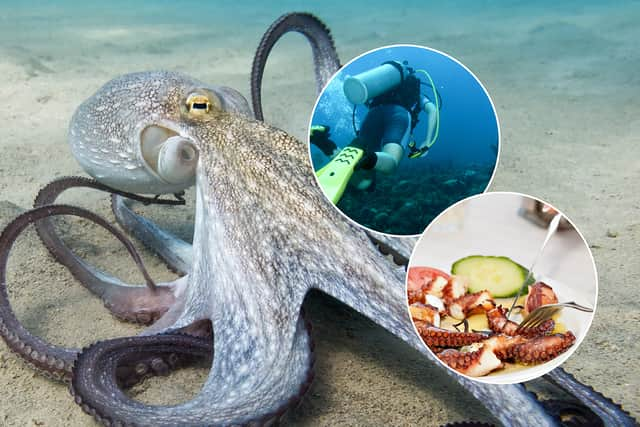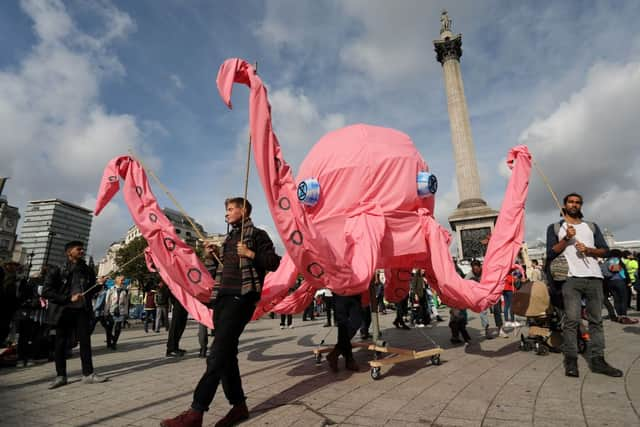Can you ethically farm an octopus? Experts clash over intelligence and environmental impacts of proposed farm
and live on Freeview channel 276
Detailed plans of the world's first commercial octopus farm have caused fiery clashes between experts over ethics and environmentalism, with some arguing the world is on the verge of making "the same mistake again" by factory-farming a whole new group of animals.
Confidential blueprints of Spanish multinational seafood company Nueva Pescanova' plans to raise as many as one million octopuses each year for the international food market were leaked to the BBC in March. While the world-first proposal hit headlines in February 2022, this was the first time the finer details of the proposed Canary Islands farming operation had been revealed to the public.
Advertisement
Hide AdAdvertisement
Hide AdNews that the octopuses - considered highly intelligent - would be killed by being exposed to freezing temperatures in an “ice slurry,” and that as many as 15 individuals could end up occupying each square metre of space has caused widespread outrage amongst scientists and activists alike. A petition calling for the President of the Canary Islands and the EU to ban octopus farming, by global activism nonprofit Avaaz, had reached around 750,000 signatures as of Friday night (31 March).
But Nueva Pescanova argues there is no hard scientific evidence the octopus is more intelligent than other marine species already being commercially farmed, and - with the global octopus market forecast to grow by 21.5% by 2028 compared to 2022 - that farming them could help protect wild populations.
So what details are available about the company's plans for their Canary Island farm, and what are the ethical and environmental arguments for and against farming octopuses?
What do we know about Nueva Pescanova's proposed Canary Islands farm so far?
Confidential planning proposal documents from Nueva Pescanova - which were leaked to campaign group Eurogroup for Animals and then given to the BBC - revealed that the octopuses, which in the wild are generally solitary, nocturnal animals, would be kept in tanks with others - at times under constant light.
Advertisement
Hide AdAdvertisement
Hide AdThe animals would be housed in roughly a thousand communal tanks, in a two-storey building in the port of Las Palmas in Gran Canaria. The common octopus species - or octopus vulgaris - would be used, and Nueva Pescanova estimated there would be "a mortality rate of 10-15%".


To supply "premium international markets" including the US, South Korea and Japan, Nueva Pescanova wants to produce 3,000 tonnes of octopus a year. According to campaign group Compassion in World Farming, which the BBC reports has studied the plans, this equated to around one million individuals each year, with between 10 and 15 animals occupying each cubic metre of tank.
It was proposed that the farmed animals be fed with industrially produced dry feed, sourced from "discards and by-products" of already-caught fish. The tanks would be filled with seawater piped in from an adjacent bay, and would be different sizes for the different phases of the octopuses' life, the BBC reports.
When it was time for them to go to slaughter, the octopuses would be killed by being put in containers of water kept at -3C, according to the documents. This method of killing seafood via "ice slurry" is already controversial, with some UK supermarkets including Tesco already moving away from using fish killed with ice without at least being stunned first, for the method's potential to cause a painful and prolonged death, the BBC reports.
What are the ethical cases for and against farming octopuses?
Advertisement
Hide AdAdvertisement
Hide AdJennifer Jacquet, associate professor of environmental studies at New York University, first wrote about the perils of octopus farming in 2019, in an article for Issues in Science and Technology. She told NationalWorld there were a number of things that made them unsuitable for farming.
"Octopuses are highly intelligent, curious carnivores. Farming them would be unsustainable, inhumane, and is completely unnecessary — they are destined for luxury markets," she said.
Jacquet added she could not see any feasible way they could be farmed, that would ensure they were both physically and mentally healthy. "I see no way that the capitalistic system of constantly cutting costs as a way to increase profits is compatible with the kind of farm that would be needed to raise octopuses in captivity in a humane way."
From the details she had seen of the Canary Islands plan, Jacquet said octopus farming would "look even worse" than she thought. "A million individuals would be killed each year — kept in some cases under constant light, in boring conditions, facing a cruel death using ice.
Advertisement
Hide AdAdvertisement
Hide Ad"We already made the mistake creating so many factory farms for highly intelligent mammals and birds. This would be making the same mistake again, for a whole other groups of animals, with the additional issue that these are carnivores, and therefore have to be fed animals," she said.
"We have the opportunity to prevent catastrophe before it begins. My biggest ethical concern about farming octopuses is we will not act swiftly enough to prevent it. But I have been energized by the interest... and initiatives around the world to intervene."
Australian philosopher Peter Godfrey-Smith, author of Other Minds - a book on the evolution of intelligence that named cephalopods like octopuses as "probably the closest we will come to meeting an intelligent alien" - also weighed in on the ethical debate, telling NationalWorld he thought the animals were "completely unsuited to farming".


A spokesperson for Nueva Pescanova told NationalWorld the octopus had developed an outstanding resolute ability to seek and find protection from potential predators or environmental hazards, due in part to its unique physiology.
Advertisement
Hide AdAdvertisement
Hide Ad"This being said, there is no scientifically validated knowledge about the 'intelligence' of the octopus, or whether it is more or less intelligent than other marine species that are already farmed," they said.
The company's proposed cultivation process complied with European legislation on animal welfare - some of the most demanding worldwide - they said, while also being rooted firmly in extensive research, carried out with the aim of determining welfare indicators and obtaining reference values for the species.
"At Nueva Pescanova our priority is to guarantee animal welfare by applying to the cultivation process the conditions of the species in the wild," they said. Many of their studies had demonstrated that by providing optimal conditions, including light, temperature and salinity, and an adequate diet for each of their stages, octopuses "adapt normally to group living environments without territorial aggression".
Some of their extensive work included developing systems to control parameters - like water, light, and space - with 360º monitoring for octopuses in the breeding and hatching stages.
Advertisement
Hide AdAdvertisement
Hide AdOther research priorities included identifying the octopus microbiome - or healthy bacteria populations - and comparing it with wild populations; and identifying stress biomarkers - or hormones - in the species. "Our research team has achieved an environment inside the pool with optimal conditions for octopus culture that ensure their wellbeing, and [their] behaviours are evidence of this."
What are the environmental cases for and against farming octopuses?
Jacquet told NationalWorld her biggest environmental concern was that octopuses are carnivores. "So we will have to feed them, which means further exploiting other animals from the sea, like crab or hake."
Octopuses have a food conversion rate of at least 3-to-1, meaning that the weight of food needed to sustain them was about three times the weight of the animal, so it could end up putting additional pressure on wild fish and invertebrate populations.
Octopus farms will also create pollution just like Atlantic salmon farming, she said, with some environmental impacts of aquaculture including nitrogen and phosphorus from faeces and food decomposition, as well as diseases and chemicals, making their way into the water system.
Advertisement
Hide AdAdvertisement
Hide AdJacquet was not convinced farming octopuses would offer any environmental advantages over catching their cousins in the wild, either. "We are very likely overexploiting octopuses in the ocean and threatening the future of many species, but as individuals, it is easy to see that wild octopuses live a much better life than those that are being fattened in barren plastic housing for human consumption."
She continued: "They have an opportunity to be curious, to hunt, and to play. I do not wish a life in a factory farm on any living being."
However, the Nueva Pescanova spokesperson argued farming octopuses could help protect wild fishing grounds and guarantee the sustainability of the species in the wild, while also responding to the growing demand for seafood products.
"The success of the fishing and aquaculture activity depends, to a large extent, on the productivity of the natural ecosystems, so that responsible action is a priority objective of the company," they said.
Advertisement
Hide AdAdvertisement
Hide AdThe spokesperson said a recent University of Melbourne study found aquaculture could lead to numerous ecological benefits, including the recovery of species, and the restoration, rehabilitation and protection of habitats.
"Through this project we will be able to help to repopulate the octopus species in the future while ensuring animal welfare by applying species-specific conditions in the wild to the farming process," they added.
Comment Guidelines
National World encourages reader discussion on our stories. User feedback, insights and back-and-forth exchanges add a rich layer of context to reporting. Please review our Community Guidelines before commenting.
